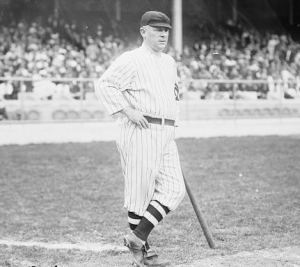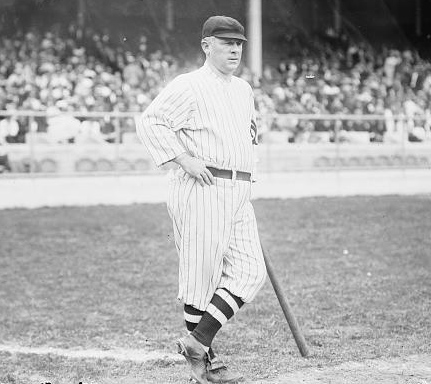June 18, 1894: The Bunker Hill Day Massacre
 Bunker Hill Day, commemorating the Revolutionary War battle, arrived in Boston on Monday, June 18, 1894. For those in search of sporting entertainment as the calendar crept toward the first day of summer, two National League contenders would play a morning-afternoon doubleheader at the Congress Street Grounds. The host Boston Beaneaters, winners of the previous three NL pennants, held a record of 30-15 that was only good enough for second place. The Beaneaters trailed the 28-10 Baltimore Orioles, the surprise of the still-young season.
Bunker Hill Day, commemorating the Revolutionary War battle, arrived in Boston on Monday, June 18, 1894. For those in search of sporting entertainment as the calendar crept toward the first day of summer, two National League contenders would play a morning-afternoon doubleheader at the Congress Street Grounds. The host Boston Beaneaters, winners of the previous three NL pennants, held a record of 30-15 that was only good enough for second place. The Beaneaters trailed the 28-10 Baltimore Orioles, the surprise of the still-young season.
Since joining the NL in 1892 from the defunct American Association, the Orioles had been a second-division club with finishes of 12th and then eighth. Manager Ned Hanlon, however, had fostered a family atmosphere1 within an 1894 lineup that was the NL’s youngest by average age. His infield of Dan Brouthers, Heinie Reitz, Hughie Jennings, and John McGraw was “all that could be desired”;2 however, the newcomers to the heights of the championship standings also spawned resentment among those who felt the Orioles did not belong among the class of elite clubs.3
The Bunker Hill Day doubleheader was the start of a four-game series. On the preceding Saturday, Boston finished a three-game home sweep of the Louisville Colonels, the series attracting sparse crowds to Congress Street. The Beaneaters’ days at that ballpark appeared to be numbered with the brick grandstand at the South End Grounds expected to be complete by mid-July.4 The Orioles had defeated St. Louis, 12-5, in Baltimore on Saturday. Making their way by train to Boston, they stopped at Newark for a Sunday match against Ironsides, the semipro champions of New Jersey. The Orioles defeated New Jersey’s finest semipros, 11-3, but the effort and the evening train ride to Boston may have contributed to the debacle that awaited them in the opening game of the twin bill.
Under the “boiling hot sun” of midmorning, a sparse crowd reported to be 2,066 occupied the stands for the series opener. Jack Stivetts received the pitching assignment for the home team. While one commentator believed Kid Nichols and Tom Lovett were the “only [pitchers] under contract who can be depended upon,”5 Stivetts would join Nichols as one of the workhorses for the 1894 Beaneaters. Lovett would be released within weeks and would not appear in another NL game. Hanlon handed the ball to veteran right-hander Tony Mullane. The 36-year-old had been an effective hurler through the 1892 season, but his abilities were fading fast. He struggled in 1893, joined Baltimore in June of that season, and was traded to Cleveland on July 13 for future Hall of Famer John Clarkson.6
The story of the June 18 game really begins and ends with the first inning. The Orioles faced a Boston defense that “has been very good of late.”7 Willie Keeler and Steve Brodie got on base in the top of the first, but didn’t score. Boston had a much different inning, and the Beaneaters’ frame “was one of the most terrific fusillades of singles, doubles and home runs.”8 Bobby Lowe led off with a single and Herman Long also singled to right field, putting runners at the corners. With Hugh Duffy at the plate, Mullane threw a wild pitch and Lowe scored while Long took second. With the game’s first run in, “[t]he crowd was waxing warm with enthusiasm but was totally unprepared for what was to come.”9 Duffy drew a walk. Tommy McCarthy doubled, and Billy Nash and Tommy Tucker hit back-to-back singles. With four runs now across, Jimmy Bannon swatted the ball over the left-field fence, also bringing home Nash and Tucker, making the score, 7-0. Charlie Ganzel flied out to Brodie in center field for the first out, but Stivetts resumed the hit parade with a solo shot, also over the left-field fence, for a 8-0 Boston advantage; Stivetts hit a career-high eight round-trippers in 1894.
Mullane began his second tour through the Boston lineup by hitting Lowe with a pitch. Lowe stole second with Long batting, and crossed the plate on Long’s single past third base. Duffy launched a Mullane pitch deep into the outfield, and the ball struck the top of the fence and bounced over. Boston’s third home run of the inning extended the lead to 11-0. The inning was far from over. Mullane walked McCarthy before striking out Nash for the second out. Consecutive walks to Tucker, Bannon, and Ganzel scored McCarthy and left the bases loaded for Stivetts. The Beaneaters hurler singled, and Lowe did the same to start Mullane’s third trip through the order. Long and Duffy then walked, the latter pass forcing in another run. With the bases still loaded and the score 16-0, McCarthy’s grounder forced Duffy at second for the inning’s third out. The Beaneaters’ first inning consumed 40 minutes10 and witnessed 22 men coming to the plate; there were 16 runs, 11 hits, 7 walks, and a hit batsman.
The Orioles’ chances appeared so hopeless that catcher Wilbert Robinson removed himself from the game. Initially, it was believed he might be injured. Rather, Robinson did not wish to “stay there a week” through Mullane’s ineffectiveness, opting to be fresh for the afternoon game.11 Boileryard Clarke assumed catching duties for the remainder of the game. With the sun creating a warm atmosphere, there was “little fight left in either team after [Boston’s] remarkable hitting streak.”12
Still, the scoring was far from complete. Tucker singled with one out in the Boston second; two batters later, Stivetts’s single drove him in for a 17-0 advantage. Baltimore made a modest dent in Boston’s lead in the top of the third. Long made a great play from the shortstop position on McGraw’s grounder for a leadoff out, but Keeler and Brodie drew walks and Brouthers singled to score Keeler for the first Orioles run. Joe Kelley drove the ball deep into center field for a run-scoring double as Brodie crossed the plate for a 17-2 score. For the stocky Cambridge-born Kelley, the afternoon was something of a homecoming and Boston fans were favorably disposed toward the local boy.13 Reitz “banged a hot one that caromed off Nash”14 at third and scored Brouthers. The third inning ended at 17-3 when Long snared a liner off the bat of Jennings and doubled Kelley off second base. The fourth and fifth innings proved scoreless, but Baltimore scratched another run through singles by Jennings, Mullane, and McGraw in the top of the sixth. It was 17-4, Beaneaters.
The Beaneaters’ half of the sixth provided “another picnic.”15 Mullane issued his 10th walk of the game, to Duffy, who went to third on Nash’s double. Tucker also doubled to score both baserunners for a 19-4 lead. Bannon singled, Ganzel reached on Reitz’s muff at shortstop, and Stivetts and Lowe hit back-to-back doubles for three more Boston runs and a 22-4 advantage. Mullane was finally relieved of his misery, with Bert Inks taking over pitching duties for the Boston seventh. The Beaneaters added two more runs in that inning. Duffy and Frank Connaughton (who had replaced McCarthy in the third inning) hit consecutive singles, and Tucker’s double scored them both. Boston now led 24-4.
There was little the league leaders could do at this point to make the score respectable. The combination of a “well-placed bunt”16 and a bad throw from Stivetts permitted McGraw to claim second base in the eighth. Brodie’s single to right scored McGraw. For the ninth inning, Tom Smith took the ball from Stivetts. Dubbed a “new college find,”17 the young left-hander had made his Beaneaters debut on June 6 and this day was his second and last of the season. His appearance “showed speed and curves, but lacked command.”18 As a result, Baltimore added two consolation runs. Kelley singled and took second on a wild pitch. Jennings was hit by a pitch before Clarke’s drive past Connaughton scored both baserunners. Smith walked McGraw and Keeler to load the bases, but Brodie flied out to Duffy to end the game at Boston 24, Baltimore 7.
For all of the runs scored by Boston in the opener, the club finished the day in the same position as it started. After scoring four in the first inning of the second game, Baltimore maintained a lead until the end, winning 9-7. While the day ended in a split result, the Beaneaters had served notice that they would not surrender their pennant without a fight.
Sources
In addition to the sources cited in the Notes, the author also consulted baseball-reference.com.
Notes
1 Albert Mott, “Baltimore Bulletin,” Sporting Life, June 30, 1894: 4.
2 Ibid.
3 Ibid.
4 “Caught on the Fly,” The Sporting News, June 23, 1894: 3. The grandstand had burned down on May 15 in a ruinous fire that spread beyond the ballpark and destroyed 200 neighborhood homes. While the grandstand was being rebuilt, the Beaneaters played home games at the Congress Street Grounds, home to Players’ League and American Association teams in 1890 and 1891.
5 “Leaders to Meet,” Boston Globe, June 18, 1894: 6.
6 Clarkson would never register an appearance with the Orioles.
7 “Batting Better Than Ever,” Boston Globe, June 18, 1894: 6.
8 “League Leaders,” Boston Daily Advertiser: June 19, 1894: 2.
9 “Had Both in Hand,” Boston Journal, June 19, 1894: 5.
10 “Orioles Lose and Win,” Baltimore Sun, June 19, 1894: 6.
11 “Diamond Flashes,” Baltimore Sun, June 19, 1894: 6.
12 “Had Both in Hand.”
13 “Leaders to Meet.”
14 “Orioles Lose and Win.”
15 Ibid.
16 T.H. Murnane, “They Quit Even,” Boston Globe, June 19, 1894: 7.
17 “Orioles Lose and Win.”
18 Ibid.
Additional Stats
Boston Beaneaters 24
Baltimore Orioles 7
Congress Street Grounds
Boston, MA
Corrections? Additions?
If you can help us improve this game story, contact us.


